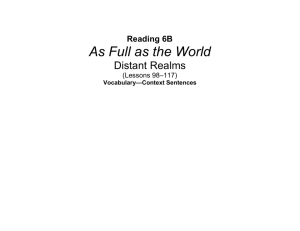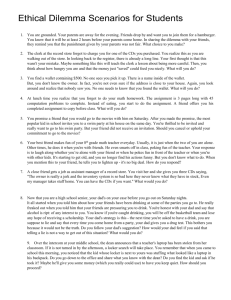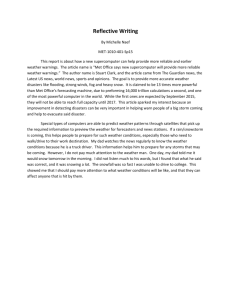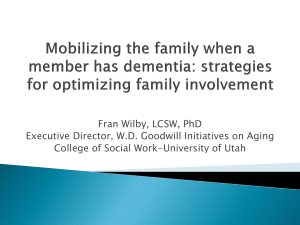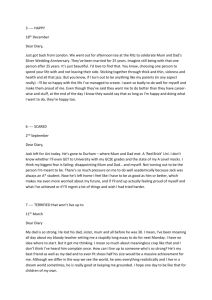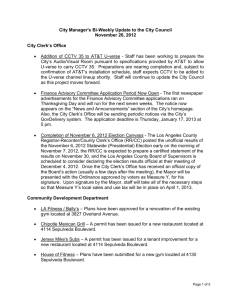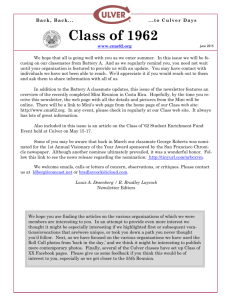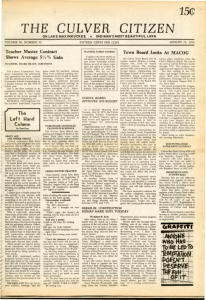"The Pharmacist`s Daughter" (LA Weekly)
advertisement
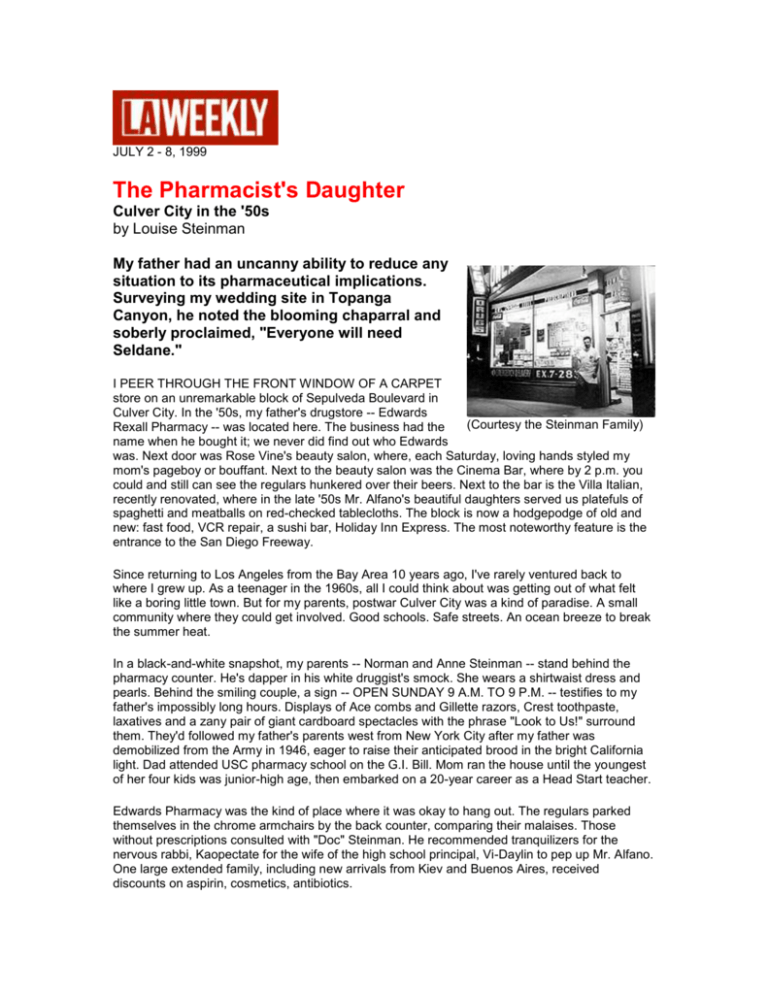
JULY 2 - 8, 1999 The Pharmacist's Daughter Culver City in the '50s by Louise Steinman My father had an uncanny ability to reduce any situation to its pharmaceutical implications. Surveying my wedding site in Topanga Canyon, he noted the blooming chaparral and soberly proclaimed, "Everyone will need Seldane." I PEER THROUGH THE FRONT WINDOW OF A CARPET store on an unremarkable block of Sepulveda Boulevard in Culver City. In the '50s, my father's drugstore -- Edwards (Courtesy the Steinman Family) Rexall Pharmacy -- was located here. The business had the name when he bought it; we never did find out who Edwards was. Next door was Rose Vine's beauty salon, where, each Saturday, loving hands styled my mom's pageboy or bouffant. Next to the beauty salon was the Cinema Bar, where by 2 p.m. you could and still can see the regulars hunkered over their beers. Next to the bar is the Villa Italian, recently renovated, where in the late '50s Mr. Alfano's beautiful daughters served us platefuls of spaghetti and meatballs on red-checked tablecloths. The block is now a hodgepodge of old and new: fast food, VCR repair, a sushi bar, Holiday Inn Express. The most noteworthy feature is the entrance to the San Diego Freeway. Since returning to Los Angeles from the Bay Area 10 years ago, I've rarely ventured back to where I grew up. As a teenager in the 1960s, all I could think about was getting out of what felt like a boring little town. But for my parents, postwar Culver City was a kind of paradise. A small community where they could get involved. Good schools. Safe streets. An ocean breeze to break the summer heat. In a black-and-white snapshot, my parents -- Norman and Anne Steinman -- stand behind the pharmacy counter. He's dapper in his white druggist's smock. She wears a shirtwaist dress and pearls. Behind the smiling couple, a sign -- OPEN SUNDAY 9 A.M. TO 9 P.M. -- testifies to my father's impossibly long hours. Displays of Ace combs and Gillette razors, Crest toothpaste, laxatives and a zany pair of giant cardboard spectacles with the phrase "Look to Us!" surround them. They'd followed my father's parents west from New York City after my father was demobilized from the Army in 1946, eager to raise their anticipated brood in the bright California light. Dad attended USC pharmacy school on the G.I. Bill. Mom ran the house until the youngest of her four kids was junior-high age, then embarked on a 20-year career as a Head Start teacher. Edwards Pharmacy was the kind of place where it was okay to hang out. The regulars parked themselves in the chrome armchairs by the back counter, comparing their malaises. Those without prescriptions consulted with "Doc" Steinman. He recommended tranquilizers for the nervous rabbi, Kaopectate for the wife of the high school principal, Vi-Daylin to pep up Mr. Alfano. One large extended family, including new arrivals from Kiev and Buenos Aires, received discounts on aspirin, cosmetics, antibiotics. At home at night, Dad ordered from the McKesson distributor, chanting those magical words into the phone: "one only phenobarb, two only Doriden, four only Librium, one dozen Penbritin, four ounces paregoric." He believed in drugs, doling out Preludin to my dieting sister, Benadryl to my mom and Ritalin to me when I needed to pull an all-nighter for European History finals. If you felt sick, you were expected to "take something." If you refused to help yourself, my father would cross his arms, sigh, pause for effect and grumble, "Then suffer." It always worked. The man had an uncanny ability to reduce any situation to its pharmaceutical implications. In 1988, surveying my wedding site in Topanga Canyon, he noted the blooming chaparral and soberly proclaimed, "Everyone will need Seldane." We all worked in the store at one time or another. My younger brother delivered prescriptions in the red Corvair, dreading the nursing homes where arms reached out to touch him. My older brother distracted IRS auditors with offers of Hershey bars and Eskimo Pies, and he often worked the front counter. "When men wanted to buy condoms, they used a signal," he recalls. "Two fingers on the counter, like legs apart." For her part, my sister wrapped boxes of Kotex sanitary napkins in plain brown paper before displaying them on the shelves. Reticence and modesty were the era's reigning virtues. My after-school job was counting pills from large brown bottles into smaller dark bottles in the back room. I'd commandeer a Heath bar from the candy display, a pile of comics from the magazine rack. I'd munch, read a page, count a hundred tablets. Take another bite, read another page, count another hundred. I especially liked biblical comics, like Solomon and Sheba, or Spartacus, characters forever linked in my memory with the smell of vitamin B. Once a week, we drove over to visit my grandparents in the Crenshaw district. On the way, I always marveled at MGM's giant painted "sky" backdrop on Jefferson Boulevard. As wide as a football field, this "sky against the sky" could be daylight blue, twilight gray, sometimes inky black, depending on the scene being filmed. In the '50s and '60s, MGM and Desilu were our neighbors, illusion the hometown product. My little brother and his friends regularly scaled the backlot fence, leading the security guards on chases straight out of the Keystone Cops. A silent-film actress was one of my dad's favorite customers; he delivered her prescriptions to the well-to-do part of town in person. Some evenings, my dad and I drove around L.A. inspecting other pharmacies. We studied the window displays at Horton & Converse in Beverly Hills, the sunglass racks at the Owl Rexall on La Cienega. They were the competition; Thrifty Drug was the enemy. Dad saw what was coming. Sure, the chains sold everything cheaper. But didn't people see what they'd lose? They'd lose the pharmacist who remembered that Sam Elliott was allergic to penicillin, that Mrs. DeLouise's toddler didn't like cough syrup flavored with wild cherry. A lot more would be lost, of course. The monumental landmarks of the old neighborhood -- the Big Doughnut and the Rollerdrome -- are long gone. The smallest inhabitants are gone, too -- the tiny frogs who sang in Ballona Creek before the channel was completely encased in concrete. They've pulled up the railroad tracks that ran the length of Culver Boulevard. The whoop of the midnight freight -- one of the few romantic sounds of my childhood. A FEW YEARS AGO, AN ARCHITECT FRIEND OF mine wanted to see where I grew up. I told him it was nothing unusual -- a boxy three-bedroom amid similar boxy stuccos. "At least you got a curve in it," my friend said when I finally steered him down the nearly treeless street, "that's something." Our concrete back yard featured a small rectangular swimming pool where my sister could swim to strengthen her limbs. My older brother remembers the day, in August 1951, that she got sick. He remembers my father taking my grandmother into a bedroom. He heard the word "polio," then a wail. Dad took some phenobarb from Mother's bureau and gave it to my grandmother. "Stop crying!" he begged her. It was a time not to dwell deeply on painful emotions. The war was over; Dad's memories of brutal combat in the Pacific were buried away, never discussed. As I turn on to our street, I remember walks with my father to Taylor's Liquors, around the corner, to buy milk. We often passed Mr. Robbins, who wore soiled overalls and muttered to himself. His daughter was in my fourth-grade class. The boys made faces if they had to hold hands with her, because she smelled as if she'd messed herself. "You should always be nice to Mr. Robbins," Dad said. "Mr. Robbins is shell-shocked." I thought of the small green turtles with red and pink roses painted on their shells, the ones I liked to watch in the pet department at Grant's Variety in that proto-mall called Culver Center. Dad told me the paint would slowly suffocate the turtles. I wanted to bring them all home and scrub off their floral death sentence, but there were too many of them. "Shell-shocked" had something to do with why Mr. Robbins talked to himself and why his poor daughter smelled so bad. I pull up to the old house and sit awhile in my car. It looks practically the same -- with brighter paint, new, lush landscaping, a satellite dish on the roof -- yet it feels different. I will myself to hear and smell the lively tumult of a family meal: sibling arguments, hovering grandparents, Mom's pot roast, Dad's wisecracks. Aha! The Chinese elm -- my old climbing tree -- still stands in the yard of the house just at the curve. I get out and hurry toward it, consider hauling my middle-aged body up its stippled trunk, but stop in my tracks when the front door opens. The current resident eyes me with justifiable suspicion. What am I doing in his front yard? I'm tongue-tied. In my mind, the Brittons still live here. I spent hours in their den, happily perusing the gory fates of the saints in the picture books their daughters brought home from St. Augustine's Catholic School. Driving away on Washington Boulevard, I stop at Taylor's Liquors, but old Sam Taylor with his pomaded hair, the Masonic pin on his lapel, is no longer there. I buy a red licorice whip from the Korean proprietor. A few blocks farther down, astonished to see the minaret of a gleaming mosque rising several stories high, I brake suddenly. The car behind me honks impatiently. It's rush hour. AFTER MY FATHER'S UNEXPECTED DEATH IN 1990, I longed to see him in a dream. Two years passed before he made his appearance. I was sick in the dream, it was nighttime and I was driving through Culver City in the pouring rain, looking for a pharmacy where I could fill my prescription. I tried a Sav-On, a Thrifty Drug. At each one, the on-duty pharmacist shook his head. Continuing on in the downpour, I noticed a corner pharmacy, a relic from the '50s. Dripping wet, I ran inside. There behind the counter, wearing his familiar white smock, stood my father. He was a small man; but in the dream he was huge. He was a gentle man; but in the dream he raged. "You've been ignoring me. You haven't visited in months!" I protested, insisting he was dead. He grew even angrier. I woke up, heart racing. What did he mean? What had I ignored? Just a few weeks later, clearing out my parents' garage, I uncovered a box containing hundreds of letters my dad wrote home to my mother as an Army infantryman during the Pacific War. As I read them, I began to understand his longing for normalcy, for quietude, for a small town like Culver City. I began to comprehend what an accomplishment it is to make a home, a life, and a world of possibilities for your children. I began to understand why my father believed that if there's a cure for what ails you, why suffer?


